Newly-opened California City ICE Detention Facility: Dangerous for Disabled People

Newly-opened California City ICE Detention Facility: Dangerous for Disabled People
In California, a person is “Incompetent to Stand Trial” or “IST” if they are unable to understand the nature of their criminal proceedings or to assist counsel in their defense because of a mental health disability or developmental disability.
Newly Opened
California City
ICE Detention Facility: Dangerous for Disabled People
A Report by Disability Rights California
Disability Rights California (DRC) conducted a monitoring visit at the California City Immigration and Customs Enforcement (ICE) Immigration Processing Center (California City) in September 2025, shortly after the facility began confining people. Despite being open for about four weeks before DRC’s monitoring, DRC had already received numerous distressing reports that people with disabilities were experiencing poor medical care and substandard living conditions at California City. The facility, a former prison, is located in a desolate area of the Mojave Desert in Kern County, California and is operated by CoreCivic, a private company that contracts with ICE to provide custody services.
Disability Rights California is the designated protection and advocacy system for people with disabilities in California. DRC is charged under federal and state laws with protecting and advocating for the rights of people with disabilities, including through the monitoring of facilities that provide care and treatment to such individuals.1
During the monitoring visit, DRC investigated the reports it had received and sought to determine whether ICE and CoreCivic are subjecting people with disabilities to abuse and neglect.2 DRC toured all areas of the facility accessible to the people detained there, including areas used for intake, food preparation, housing, segregation, medical and mental health care, recreation, and visitation. DRC also spoke with CoreCivic representatives, ICE officials, and California City staff, and interviewed 17 individuals detained at the facility.
Based on the conditions DRC observed, its interviews with leadership and individuals held at California City, and reviews of related information, DRC finds that ICE and CoreCivic are subjecting people with disabilities to abuse and neglect.
In particular, DRC finds that California City:
- Fails to provide access to critical medical and mental health care;
- Fails to process and address disability-related requests in a timely manner;
- Fails to meet people’s basic needs, including adequate food, water, and clothing;
- Employs staff who harass detainees, and;
- Utilizes solitary confinement unnecessarily.
Disability Rights California protects and advocates for the rights of all people with disabilities in the State of California, regardless of their ethnicity, cultural background, language, or immigration status.
Background
Before re-opening its doors in September 2025 as an ICE detention facility, California City functioned as both a federal and state correctional facility. CoreCivic (formerly Corrections Corporation of America) built the facility in 1998.3 In 2000, federal officials contracted with CoreCivic to use California City to house federal prisoners.4 In 2013, the California Department of Corrections and Rehabilitation (CDCR) took over operations of the facility to use it as a state prison.5 In 2023, CDCR stopped using California City as a prison.6 The facility remained vacant until it was repurposed as an immigration detention facility by ICE and CoreCivic.
On the dates of DRC’s monitoring inspection, ICE was detaining approximately 500 men at the facility. At the time, two general population housing dorms were in use, each consisting of three pods with the capacity for 80 detained individuals, as well as one pod on a separate dorm for segregated housing. DRC understands that the population at the facility has grown and now includes men and women, with a maximum operating capacity of over 2,500.7
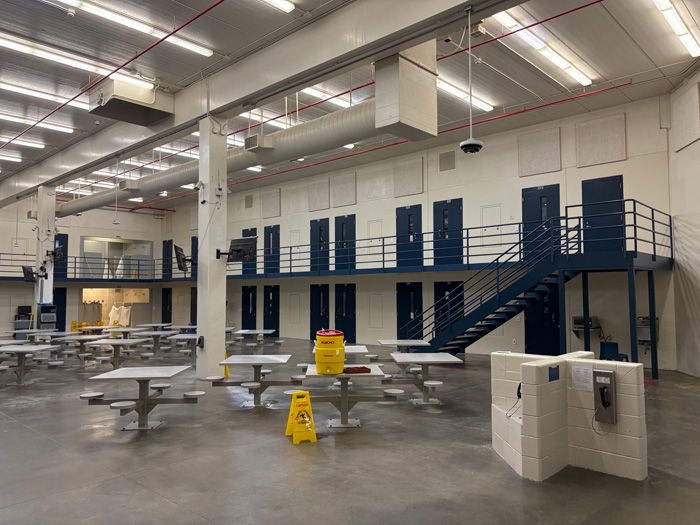
Findings
Failure to Provide Critical Medical and Mental Health Care
Although facility staff told DRC that they take measures to meet the healthcare needs of detainees, nearly every detained individual DRC interviewed reported significant disability related concerns, including issues accessing medical care.
“This is the worst medical care I’ve ever experienced. It’s medical negligence and incompetence. They are understaffed and underprepared. The medical staff are not abiding by their oath.”
Disruptions in critical surgeries
Multiple individuals reported extreme delays to critical surgeries as a result of their abrupt transfers to California City without adequate continuity of care. For context, everyone DRC interviewed transferred to California City from another ICE facility, primarily Golden State Annex and Mesa Verde. One individual reported that his previous detention facility, Mesa Verde, had scheduled a surgery to prevent blood clots. However, ICE then transferred him to California City, where he had gone weeks without the surgery, despite following up with health care staff repeatedly about it.8 Another individual reported that Golden State Annex had scheduled surgery for a large hernia, but ICE then transferred him to California City. When DRC met with this individual, his surgery had not been rescheduled.9 He was in so much pain that he needed assistance moving around the facility.
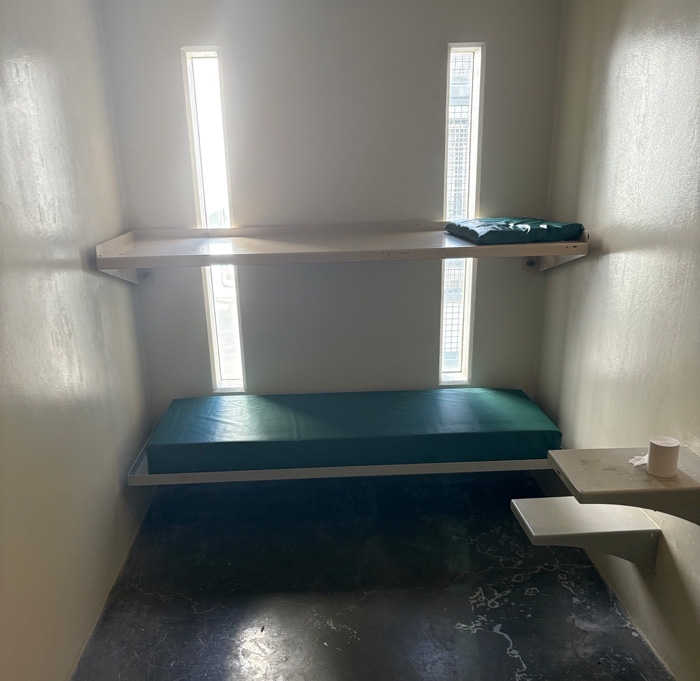
Inadequate medication management
Many individuals reported not receiving needed medication, even though facility staff claimed that Licensed Practical Nurses distribute medications daily in the units.10 One individual reported that prior to his detention, he regularly took medication three times a day to manage his seizures. At California City, he was forced to go without medication for days at a time.11 Another individual reported going seven days without diabetes medications, during which time he felt physically unstable. He also reported not receiving high blood pressure or migraine medications to manage these conditions, despite reportedly submitting written requests regarding these issues.12
Another individual reported that he was given medication to manage a mental health disability, but he did not know what type of medication the facility staff provided him, despite asking for such information. He also reported that the medications the facility provided were not working, resulting in severe mental health symptoms. He had serious concerns about his worsening mental health due to conditions at California City.
Individuals also stated that medication distribution often happens very late, when individuals are likely to be sleeping. People also reported not having access to “Keep on Person (KOP)” items, such as nasal sprays, fungal powder, and eyedrops.
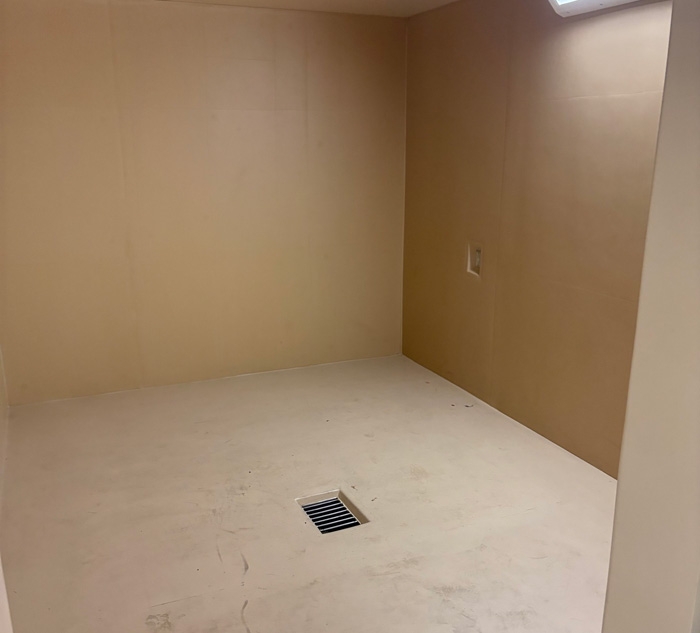
Lack of timely responses to sick call requests
Several individuals reported submitting sick call requests but not receiving responses or medical care in a timely manner. For example, one individual reportedly requested medical care for blood in his urine, but remained without a medical evaluation for days. It was not until the day before DRC’s visit that he reportedly received Advil, but no other medical care.13 Another individual reported having a thyroid condition that requires regular blood testing for monitoring and medication management, which he was receiving at Mesa Verde. Although he submitted written requests for evaluations at California City, he had not received a response nor any blood tests.14 When DRC interviewed him, he had a visibly enlarged lump on his neck and stated that he felt physically weak. One individual even showed DRC multiple copies of written requests he had submitted, none of which California City staff had responded to.
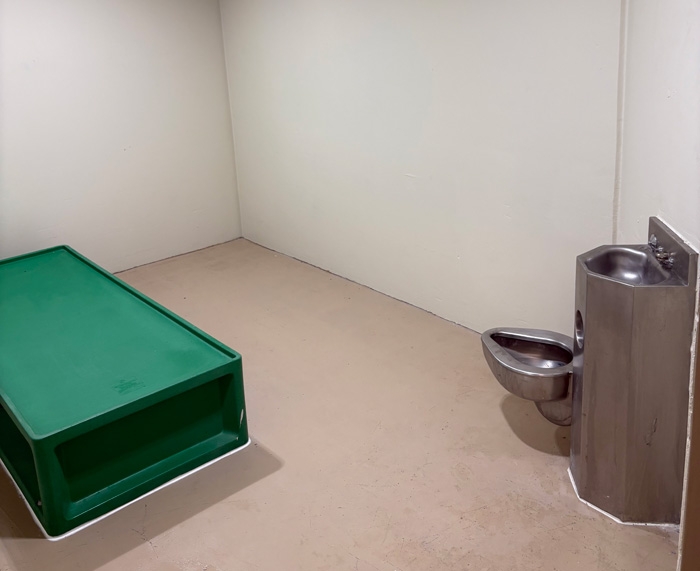
Poor mental health crisis management
During our monitoring visit, people also shared concerns about the mental health care provided at California City. One individual reported being placed in a mental health observation cell for four days and not having access to a working toilet, shower, blanket, or toothpaste. While in the observation cell, he did not receive any psychological services. Instead, custodial staff only briefly checked on him every fifteen minutes. He reported that the harsh conditions led him to withhold the severity of his mental health symptoms to avoid staying in that cell.
Failure to Process and Address Disability-Related Requests
During our visit, DRC met with people who reported not receiving responses to their disability-related needs. Furthermore, facility staff informed DRC that California City does not employ a dedicated disability or accommodations specialist.15
One individual managing a hernia reported difficulties walking, showering, and accessing the recreation yard. After making several requests over approximately three weeks for a wheelchair, staff finally provided him with one during the second day of DRC’s monitoring visit. He remained concerned that the wheelchair would be taken away at any moment. People also reported that staff are denying requests for supportive footwear.16 One individual shared that a prior ICE facility issued him orthopedic shoes, but that California City only provided him with oversized rubber clogs, which caused him significant pain throughout his feet and limited his ability to walk. Despite many requests for supportive footwear, his requests were reportedly ignored.17
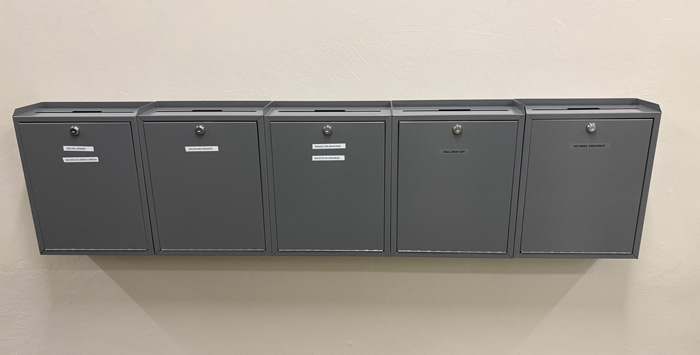
Failure to Address People’s Basic Needs
Unsuitable and dirty housing units
People reported to DRC that California City was unprepared for them upon first arrival, such that they were forced to sleep on the floor of a cafeteria without any mattress or pad. After sleeping on the floor, staff reportedly took people to units that were unsuitable and dirty. According to our interviewees, the units initially did not have working sinks or toilets.18 Several individuals also reported significant flooding in the housing units due to a rainstorm, with water pouring from the walls and filling the units. People also reported that just days prior to DRC’s visit, California City began offering detained individuals jobs to clean the housing units. The work program at California City pays detained individuals just two dollars per day.
People also expressed concerns about dust in their units. One person reported significant dust built up in the air vents. Individuals were concerned that they were being exposed to dirt and stated that they had been getting cold-like symptoms that seemed to spread throughout the units quickly. Several individuals reported that they had resorted to blocking the vents in their cells to limit the flow of dust.
Many people also reported a lot of trash and bird feces in the recreation yards, such that they were not allowed to use the recreation yard.19 During DRC’s visit, we observed the recreation areas and saw only one area being used. The other recreation areas had construction material and trash that had yet to be cleared.
Unsanitary water
Many people who spoke with DRC reported unsanitary tap and drinking water. People described the tap water as brown with an unpleasant taste. One individual even reported that he observed small metal particles in the tap water. Drinking water was provided in large jugs, which facility staff confirmed was tap water.20 One water jug that was opened for refill reportedly contained black mold. One detained individual stated that the water from faucets and water jugs had worsened his gastritis to such an extent that he was resorting to purchasing bottled water from the commissary. However, people reported commissary prices being very high, even when compared to other ICE detention facilities and state prisons, which resulted in this individual reportedly becoming dehydrated due to the limited access to potable water.
Inadequate clothing supplies
People reported long delays in the distribution of clothing, such that they had resorted to cleaning their clothes in sinks.21 One individual reported that, initially, the facility was exchanging laundry, but they had stopped. According to this individual, even though there was a bin for laundry, staff did not take the bin for laundry exchange. He reported that staff told him this was due to the increase in population. He further reported that he made a request for new clothing and, two weeks later, he was still waiting to receive it. As of the time of this report, this individual states he is currently washing his clothing in the sink of his cell. People further reported that the lack of clothing exchange was affecting their health, as the housing units are kept very cold, but the facility did not provide people with extra clothing to keep warm.22 Many people reported cold- and flu-like symptoms that were difficult to manage without access to adequate clothing.
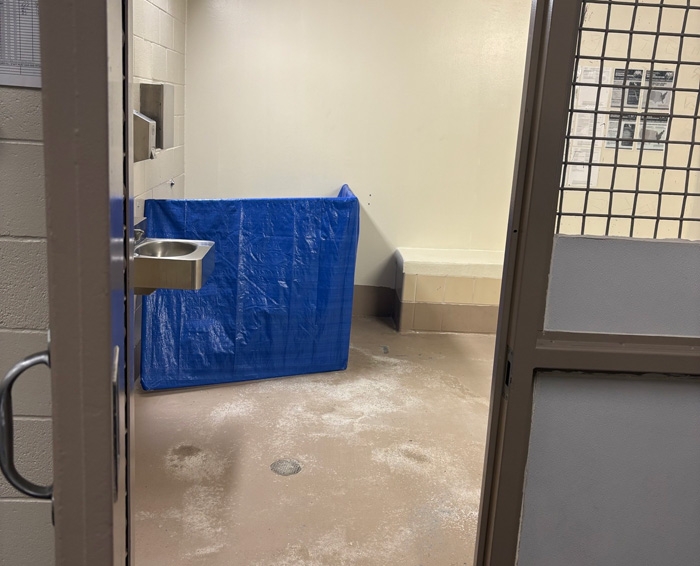
Low-quality and insufficient food
People detained at California City reported inedible or low-quality food.23 For example, multiple people told DRC that they received cold, hard beans and potatoes, which they had to throw away. Other individuals reported that the quantity of food was insufficient, such that at least one person lost a considerable amount of weight since their arrival at the facility. One person also reported that they received a special diet at their previous facility to help manage a medical condition, but they had not received that special diet at California City.24
Most of the people DRC met reported being treated inhumanely, with at least one stating that “they are treating us like animals.” Generally, individuals said that staff were running the facility like a high-security prison, often resorting to threats of violence.
Harassment by staff
One individual reported having his head forcefully pushed into a wall.25 Others described staff walking through housing units wearing gas masks and threatening to pepper-spray individuals. Another person described seeing a staff member spit in his food, explaining that he had not eaten for two days for fear that the staff were contaminating his food. Many also reported that staff regularly yelled and screamed at them in response to basic questions. Interviewees even reported that some staff threatened to put them in solitary confinement for requesting medical assistance.
People reported that the conditions resulted in people not asking for assistance due to fear of retaliation. One individual shared that based on the staff’s lack of response and threats, he decided to keep quiet and to himself, even though he was dealing with unanswered medical needs.
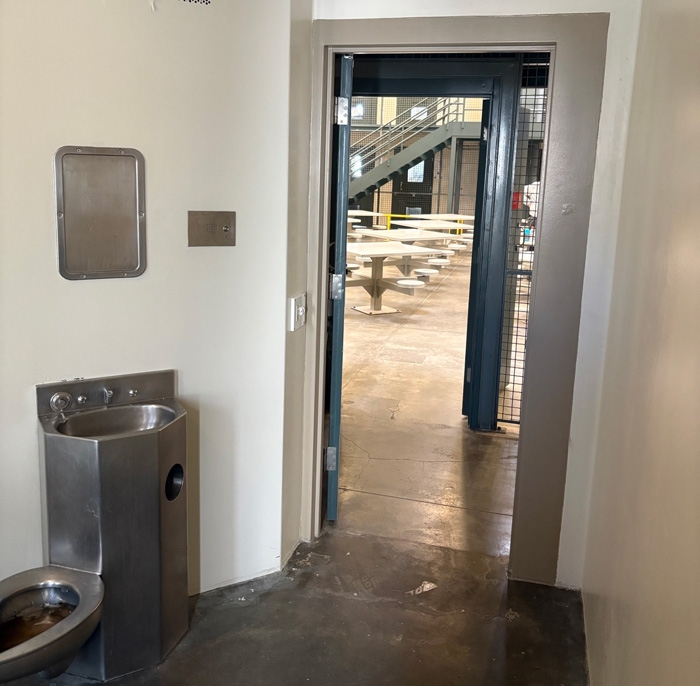
Unnecessary use of solitary confinement
When DRC visited, 27 people were held in solitary confinement at California City. They are confined in their cells nearly every hour of the day.26 This is a highly restrictive unit that is no different from a solitary confinement unit in a criminal detention facility. People in this unit have limited access to a caged outdoor area and reported that prior to DRC’s arrival, these outdoor areas were filthy with animal feces and dead birds.27
During our visit, there was a group of individuals who reported being placed in the segregation unit in retaliation for requesting improved medical care and conditions. They shared that they were not provided with a written explanation for their placement and had only been told that their actions were under investigation.28 They did not know when they would be released from isolation.29 Some were also participating in a hunger strike.
DRC followed up with several people with disability related concerns inside the solitary confinement units over a month after our visit, and they reported that the conditions remained the same. They reported that the facility did not permit them to access the dayroom, and they were regularly locked in their cells for all but a short period each day.
Conclusion
The conditions that DRC observed at California City on September 22-23, 2025, and the reports it received, are alarming. Based on the monitoring visit and related interviews, DRC finds that conditions at California City result in the abuse and neglect of people with disabilities.
DRC urges DHS, ICE, and Core Civic to immediately address the issues detailed in this report and ensure the following:
- Access to appropriate medical and mental health care;
- Processes that address disability-related needs in a timely manner;
- Access to basic needs, including adequate food, water, and clothing;
- An end to harassment by staff; and
- An end to the unnecessary or retaliatory use of solitary confinement.
DRC has serious concerns about what appears to be a rush to open the California City facility and the abuse and neglect individuals with disabilities are facing there. The conditions at California City add to mounting evidence that the current system of detention is dangerous and inadequate for all people, especially those with disabilities.
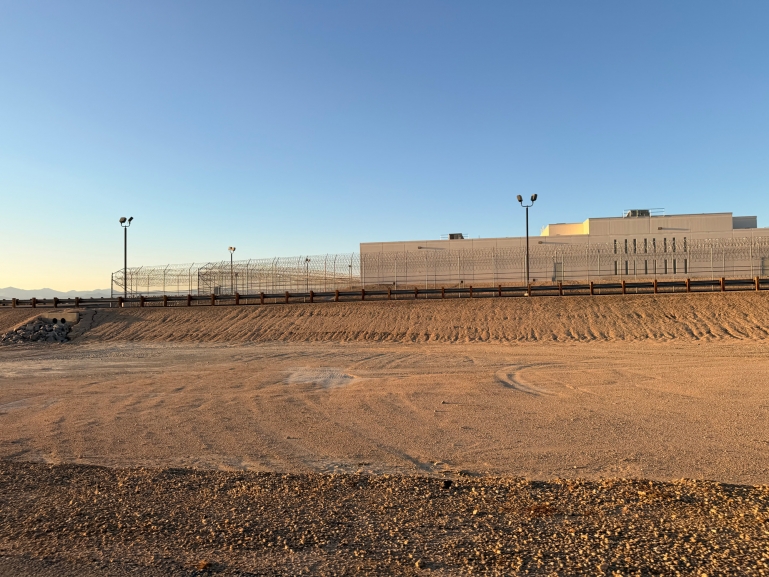

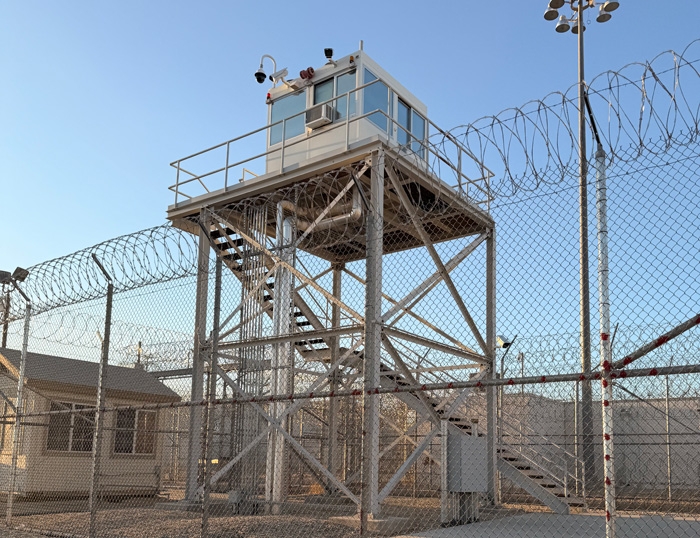
- 1. See 42 U.S.C. §§ 15001 et seq. (“Developmental Disabilities Assistance and Bill of Rights Act”); 29 U.S.C. §§ 794e et seq. (“Protection and Advocacy of Individual Rights Act”); 42 U.S.C. §§ 10801 et seq. (“Protection and Advocacy for Individuals with Mental Illness Act”); Cal. Welf. & Inst. Code §§ 4900 et seq. (“Protection and Advocacy Agency”).
- 2. "Abuse" and "neglect" are defined in federal and state law and their implementing regulations. See 42 C.F.R. § 51.2; 45 C.F.R. § 1326.19; Cal. Welf. & Inst. Code § 4900.
- 3. Daniel B. Wood, Private Prisons, Public Doubts, Christian Sci. Mon. (July 21, 1998), https://www.csmonitor.com/1998/0721/072198.us.us.1.html.
- 4. CoreCivic, Corrections Corporation of America Receives Federal Inmates in California and New Mexico, (Oct. 23, 2000), https://ir.corecivic.com/news-releases/news-release-details/corrections-corporation-america-receives-federal-inmates.
- 5. Christine Bedell, Cal City prison to house state inmates, Bakersfield.com, (Oct. 25, 2013), https://www.bakersfield.com/news/cal-city-prison-to-house-state-inmates/article_41af12cd-3acf-5a21-9485-30b7ce8af4cb.html.
- 6. Claudia Elliot, State removes all inmates from Cal City prison, remaining staff working to close facility. Bakersfield.com, (Nov. 19, 2023), https://www.bakersfield.com/news/state-removes-all-inmates-from-cal-city-prison-remaining-staff-working-to-close-facility/article_df159a52-8670-11ee-b1f7-db87ce7a3737.html.
- 7. CoreCivic, CoreCivic Announces New Contract Awards at California City Immigration Processing Center and Midwest Regional Reception Center, (Sept. 29, 2025), https://ir.corecivic.com/news-releases/news-release-details/corecivic-announces-new-contract-awards-california-city
- 8. See U.S. Immigration & Customs Enf’t, National Detention Standards § 4.3.II.D., (2025), https://www.ice.gov/doclib/detention-standards/2025/nds2025.pdf (discussing medical screenings and continuity of care for new arrivals) (hereinafter NDS).
- 9. See id.
- 10. See id. § 4.3.II.L. (requiring medication be distributed in accordance with health care provider’s instructions and procedures).
- 11. See id.
- 12. See id.
- 13. See id. § 4.3.II.A. (requiring detainees be provided access to medically necessary and appropriate medical care).
- 14. See id.
- 15. See id. § 4.7.II.B. (requiring a facility to designate a Disability Compliance Coordinator).
- 16. See id. § 4.7.II.D.2. (stating that detainees with disabilities shall generally be permitted to keep assistive devices with them at all times); 6 C.F.R. § 15.30 (providing general prohibitions against discrimination in programs or activities conducted by the Department of Homeland Security).
- 17. See NDS, supra note 8, § 4.7.II.B.1. (requiring the facility to develop a process with reasonable timelines to review detainees’ requests for accommodations related to a disability and for providing accommodations).
- 18. See id. § 4.4.II.G. (describing how a detainee should be provided with a reasonably private bathing and toileting environment).
- 19. See id. § 5.2.II.A.1. (requiring detainees have access to outdoor recreation, weather permitting, for at least one hour per day, five days per week; or six, or more hours per week, at least four days per week).
- 20. See id. § 1.1.II.I.1. (requiring the facility ensure appropriate water quality).
- 21. See id. § 2.1 (II) (B) (requiring detainees be given clean institutional clothing, bedding, towels, and personal hygiene items during intake).
- 22. See id. (requiring the facility ensure appropriate temperatures).
- 23. Sen. Bill 1132, 2023-2024 Reg. Sess., ch. 183, 2024 Cal. Stat. https://leginfo.legislature.ca.gov/faces/billNavClient.xhtml?bill_id=202320240SB1132 (authorizes a county or city health officer to investigate a private detention facility); NDS § 4.1.I. (requiring the facility provide nutritious meals).
- 24. See NDS, supra note 8, § 4.1.II.G.1. (stating detainees with medical conditions shall be described special diets as appropriate by authorized medical staff).
- 25. See id. § 2.8.II. (restricting when staff can use force against detainees).
- 26. The unnecessary and retaliatory use of solitary confinement is of serious concern. Many studies have found that solitary confinement results in long-term detrimental effects on people’s psychological, neurological, and physiological well-being. See e.g., Kayla James & Elena Vanko, The Impacts of Solitary Confinement, Vera Inst. (April 2021), https://vera-institute.files.svdcdn.com/production/downloads/publications/the-impacts-of-solitary-confinement.pdf?dm=1617381199.
- 27. See NDS, supra note 8, § 2.9.II.V. (requiring detainees in segregation be offered at least one hour of recreation per day, at least five days a week).
- 28. See id. § 2.9.II.B.2. (describing how a disciplinary segregation order detailing the reasons for placing the detainee in disciplinary segregation shall be provided to the detainee).
- 29. See id.




